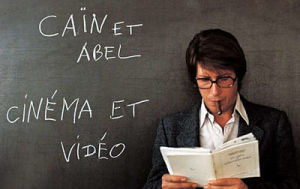STUDIO: Criterion | DIRECTOR: Jean-Luc Godard | CAST: Isabelle Huppert, Jacques Dutronc, Nathalie Baye
RELEASE DATE: 2/3/15 | PRICE: DVD $29.95, Blu-ray $39.95
BONUSES: “Scenario de Sauve qui peut (la vie)”; visual essay by Godard biographer Colin MacCabe; new interviews with Isabelle Huppert and Marin Karmitz; archival interviews with other cast and crew; British short “Godard 1980”; The Dick Cavett Show with guest Jean-Luc Godard
SPECS: NR | 88 min. | Foreign language drama | 1.66:1 widescreen | mono | French with English subtitles
Never before available on DVD (or VHS), the 1980 feature Every Man For Himself from French New Wave master Jean-Luc Godard (Weekend) was his return to more personal fictional filmmaking after a decade spent making overtly political and experimental works. He called it his “second first film” in interviews, and it does convey the same sense of kinetic energy and playfulness that distinguishes his classic works of the Sixties.
As has been the case with so much of Godard’s work, there are tossed-off moments here that are better than some other filmmakers’ entire output. Of particular interest are the moments where he blends slow motion with electronic music (the first and last time he ever did so), curiously lending both a good deal of emotion and a peculiar, alien distance to the characters’ actions.
The plot revolves around Paul Godard (Jacques Dutronc), a filmmaker, and Isabelle (Isabelle Huppert, White Material), a prostitute. Paul is breaking up with his girlfriend Denise (Nathalie Baye, A French Gigolo) and becomes one of Isabelle’s customers. After they both go through a series of stormy encounters with relatives and clients, their paths cross again when Isabelle moves into the apartment that Denise is vacating.
A new movement in Godard’s career began with Every Man… (not to be confused with Herzog’s Every Man for Himself and God Against All, aka The Enigma of Kaspar Hauser). Godard’s “comeback” to narrative storytelling ushered in an era of new explorations of male-female relationships and gorgeous, memorable imagery.
Paul Godard certainly reflects his creator in certain regards, but he seems to be a manifestation of the filmmaker’s darker instincts. Like pretty much all of the male characters in the film, he is a rather nasty specimen (thus the casting of handsome pop star Dutronc).
The women characters are the heart of the picture — Denise’s attempts to define herself without Paul, and Isabelle’s retention of her dignity in the face of an abusive pimp and crude, rich customers are underscored by Godard’s images, in which (as he notes in several interviews included here) the women continue to move forward while Paul and the other men remain stationary. The film’s most lyrical passages show Baye bicycling in the countryside, her independence conveyed through her gestures, which are isolated and emphasized through slow motion.
Over three hours of visual supplements offer insights into the film and situate it in the context of Godard’s preceding work. “Scenario de Sauve qui peut (La vie)” is a fascinating video that he made to secure funds for the film. In it, he outlines the trajectories of the characters and the tone of the film, plus bits of the plot (including an entirely different depiction of Dutronc’s lead character).
Godard biographer Colin MacCabe supplies a thorough, enlightening visual essay about the film’s status as Godard’s “comeback” (he had in fact never stopped making films and videos). The two most interesting items discussed by MacCabe are the fact that Godard had Nathalie Baye ride a bicycle for two hours straight to capture her character’s dogged determination, and that he had a well-outlined (for Godard, who disdains scripting his features ahead of time) project he was hoping to make for Coppola’s Zoetrope Studios. The film would’ve been about a couple with a blind child who are both working on a film about Bugsy Siegel; the two performers who agreed to star in the film initially were Robert De Niro and Diane Keaton.
The rarely seen British short “Godard 1980” shows that the filmmaker was uncharacteristically eager to do interviews for Every Man… The interviewers got one exclusive: Godard’s thoughts on the Marxist films he made with “the Dziga-Vertov group” for a few years in the late Sixties and early Seventies.
Also included here is a quintet of interviews with participants in the film. A vintage chat with the film’s two cinematographers, Renato Berta and William Lubtchansky, finds them bad-mouthing Godard (“Too much of our energy was wasted on psychological disputes”). They also note that one of the film’s most memorable (and bizarre) moments — in which Isabelle is involved in an absurd “daisy chain” created by a businessman client — was difficult to shoot. According to the cameramen, “He didn’t enjoy that subject matter and didn’t know how to go about it. He really found it hard showing that type of thing” (the oddity here, of course, being that he had conceived of the scene in the first place).
A new interview with Huppert shot for this release has her emphatically stating that, despite the “loose”-seeming structures of Godard’s films, there is no improvisation on-set. His precision extends to the costumes — Huppert remembers buying her wardrobe from a local department store with Godard himself in tow. She praises the poetry in his filmmaking and adds that his first character “note” for her was that the prostitute she would play should be “the face of suffering.”
The most sublime of all the supplements here is the two-part 1980 appearance by Godard on The Dick Cavett Show. The legendarily cranky filmmaker is smiling and joking throughout the chat, which ranges from a discussion of Every Man… to Cavett inquiring about Godard’s unique style of framing his characters and what he thought of the subtitles provided for his films.
The whole interview is an invaluable document for students and fans, but the most eye-opening moment for comedy aficionados has Godard discussing the French fascination with Jerry Lewis. He talks about Jerry in an academic fashion, but when pressed by Cavett as to whether he laughs at Lewis, he responds that he finds him very funny. He adds, quite perceptively, “Even when it’s not funny, it’s more funny….”
|
Buy or Rent Every Man For Himself
|
|||
|---|---|---|---|
 |
|||


Leave a Reply